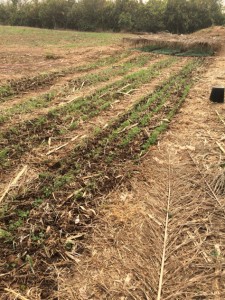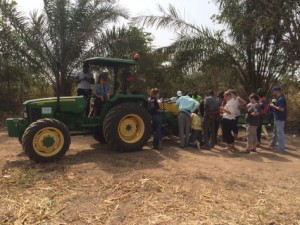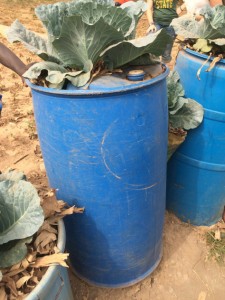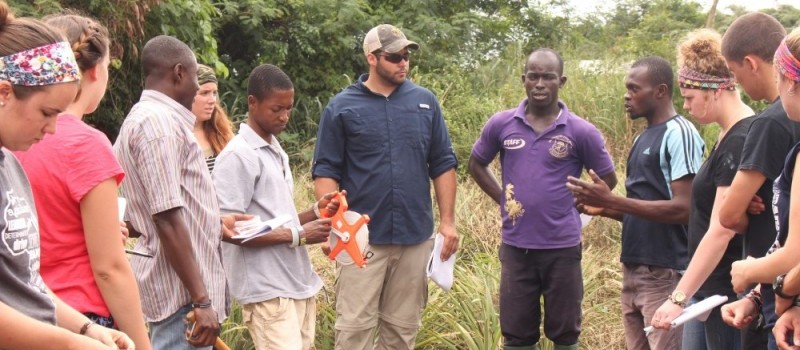I’m not sure when exactly I decided to be a farmer. Maybe it was the first time I placed a pumpkin seed inside a small film capsule with a wet cotton ball and watched it turn into a plant. Maybe it was from so many hours spent bouncing around in cabs learning from and farming with three generations of Jones before me. Maybe the when and where are not nearly as important as the why. As a farmer I know that every day I will face new challenges, every day I will learn new things, every day as a farmer I have an opportunity to grow and improve.
Crops and livestock are important to farmers as they provide us with our livelihood but like any good business man knows, people don’t just work for money. We work to provide for our families, we work to challenge ourselves and grow as individuals, and we work to improve on and care for what God and our forefathers have provided for us.
I remember one particular afternoon bouncing around on top of the toolbox in the cab of my dad’s tractor. We were putting some of last years straw bales around a small ditch in the pasture where we keep our bulls. I asked him why he was just sitting the bales in the field to rot and go to waste. He said, “Son we are farmers and if we don’t take care of what we have it cannot take care of us.” Since then we have had similar discussions many times as I was growing up.
This week I have had the pleasure of attending training on no-till farming near Kumasi with Dr. Kofi Boa. Dr. Boa, has been a life long devotee of improving farming practices in Ghana. When he was 12 years old, the youngest of four boys and the only one left in his mother’s house, a nearby farmer burnt a plot of land. The flames spread to his mother’s coco farm and burnt it to the ground. Life got very hard for Dr. Boa and his mother and since then he as devoted his life to no-till farming also known as conservation agriculture.
 Dr. Boa has attended school at the Kwame Nkrumah University of Science and Technology in Kumasi, Ghana and the University of Nebraska. He worked as a cocoa agronomist, and as a farm researcher for the Crop Research Institute before venturing out on his own to start the Center for No-Till Agriculture in Amanchia, Ghana’s Ashanti Region.
Dr. Boa has attended school at the Kwame Nkrumah University of Science and Technology in Kumasi, Ghana and the University of Nebraska. He worked as a cocoa agronomist, and as a farm researcher for the Crop Research Institute before venturing out on his own to start the Center for No-Till Agriculture in Amanchia, Ghana’s Ashanti Region.
For the training each AgriCorps Member from the Eastern Region brought along either a teacher or farmer from our community. I brought along Mr. Owusu, a hard working vegetable farmer and preacher at one of the churches in OB. Together we learned about how no-till farming can improve the soil health on our farms and how it can help us to improve efficiency and profitability. The first day of the training was great. We jumped right into the benefits of no till farming as we toured a no-till cocoa farm, maize farm, and a cabbage farm.
Throughout the day we learned more about how we can bring no-till practices back to our farms and communities. We learned about different cover crops and their particular uses such as fixing nitrogen in the soil, breaking up soil compaction, and also keeping the thick bush from taking over unplanted land. We also focused on how we can minimize the use of expensive chemical herbicides and pesticides through proper management practices.
The second day was to show the challenges of mechanized farming and I began to see many of the same challenges that farmers face in the U.S. Soil compaction, runoff, and weed control. My family has like many others moved to no-till methods of planting and it was exciting to get to learn how these technologies are coming into Ghana as well. Our group had a great morning of pulling the ripper through a compacted maize farm, nocking down a cover crop with a crimper, and planting maize with a no-till planter.
After lunch we looked at many different types of cover crops, composting methods, and irrigation solutions that we can use and teach others about. To end the day we all sat down with our community member and worked out an implementation plan to take all of our knowledge back and share it with others.
I am excited to go back with Mr. Owusu and meet with the Vegetable Farmers Association to do a demonstration on runoff and mulching at his farm. We also plan to speak to my students at the JHS and help implement no-till methods to control pests and water evaporation on our school farm and in our 4-H project farms. Finally we will meet with our community members next week to share our knowledge and answer any questions we can about no-till farming.
I know that my dad would have loved this training and It will soon lead to another conversation about caring for our farm soon. It feels good to be able to grow and learn about agriculture here in Ghana, and I am excited to continue to share my knowledge and passion here for the next few months. I know that like a farm we must each continue to grow and improve. I came to Ghana not only to share what I know but also to take a year to take care of myself. As I grow and learn from the people here like Mr. Owusu, Dr. Boa, and my community, I have realized that my passion for coaching and teaching others and challenging them to keep improving will be my life long devotion.
Cody Jones is an Agribusiness graduate from the University of Missouri. Before becoming an AgriCorps Member, Cody raised cattle and row crops and served as a state FFA officer.


